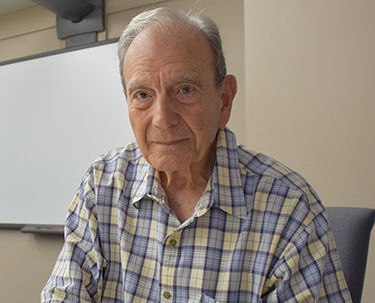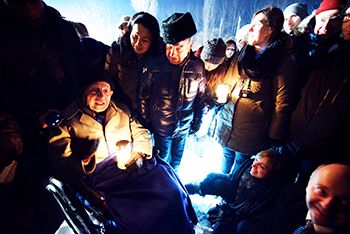
Dario Gabbai
He is perhaps the last witness to the Final Solution. As a young prisoner at Auschwitz II-Birkenau, Dario Gabbai was chosen by the Nazis to be a Sonderkommando – Jews who were forced to usher people into gas chambers, and then haul out the bodies, take them to the crematorium, and clean up the room for the next group of victims. A few Sonderkommandos survived the war, but Gabbai believes he is the only one left alive.
The experience scarred him deeply – the 93 year old still has trouble sleeping and cries easily when thinking of what he endured 70 years ago. But even when he was at the camp, he knew he was witnessing something he needed to let others know about.
“I thought that if I survive, I could tell the world,” said Gabbai, whose testimony is in the Institute’s Visual History Archive.
Gabbai, originally from Saloniki, Greece, immigrated to Los Angeles after the war and worked his way up through the fabric business. He was married for 24 years and had one daughter.
After his liberation, Gabbai began collecting documents. There were lists of Jews who were sent to concentration camps, personal recollections, photographs, passports, letters from government officials and even notes from students thanking him for sharing his story. In all, his personal archive spans from 1945 to the present.
On Aug. 1, 2014, Gabbai donated about 250 pieces of his collection to USC Shoah Foundation. The Institute took possession of the artifacts with the plan of someday putting some of them on display, but they will also be used for research.
“Before I die, I wanted to give them to somebody,” he said. “The Shoah Foundation was the best place to do it.”
As he leafs through the pages that document some of the things he’s endured, Gabbai still has trouble comprehending his life.
“I saw a lot of things I can’t even tell,” he said. “It was nothing short of a nightmare.”
On January 27, 2015, USC Shoah Foundation bore witness to something truly extraordinary. Following the ceremony at the Birkenau “Death Gate” marking the 70th anniversary of the liberation of Auschwitz, Gabbai joined a processional of survivors who walked to the remains of the crematoria at the back of the camp to light memorial candles.

The words were difficult to make out, but it didn’t matter. Gabbai’s voice was one the Nazis could never silence.